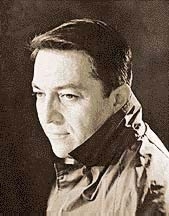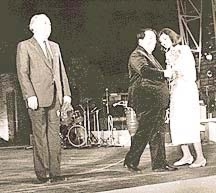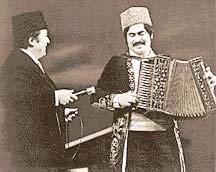
Winter 1995 (3.4)
Pages 74-75
Songs that Never
Die
Rashid
Behbudov
(1915-1988)
80th Jubilee
by Tofig Guliyev
Music
lyrics available at AZERI.org

 Musical Score and Azerbaijani words
for one of Rashid Behbudov's favorite songs, "Sana da Galmaz",
("Your Beauty Won't Last Forever") which was composed
by Tofig Guliyev is available in the magazine, pages 76-77.
Musical Score and Azerbaijani words
for one of Rashid Behbudov's favorite songs, "Sana da Galmaz",
("Your Beauty Won't Last Forever") which was composed
by Tofig Guliyev is available in the magazine, pages 76-77.

Listen to "Sana
da Galmaz" with RealAudio.
Rashid
Behbudov (Ra-SHID BEH-bu-dov) was one of Azerbaijan's greatest
singers. On December 14th, his birthday, Azerbaijanis commemorated
his 80th Jubilee (1995).
Rashid is remembered for his love songs - his melodic, lyrical
love songs. He even managed to mesmerize officials so much with
his beautiful rich tenor voice that they didn't pressure him
to sing contrived songs to glorify the Soviet system or heroes
like Stalin and Lenin. Maybe it was because officials, too, had
their own love lives. Is it possible to prohibit love?


Left: Composer and Pianist Tofig Guliyev (left) with
Rashid Behbudov. The team traveled together many years to most
major cities in the former USSR.
Right: Rashid Behbudov and his garmon player,
Kamil Vazirov.
Stardom
Many people first became
familiar with Rashid's extraordinary talent from the 1945 movie
version of the opera, "Arshin Mal Alan" (ar-SHIN MAL
a-LAN) ("The Cloth Peddler") which Uzeyir Hajibeyov
(oo-ze-YIR Ha-ji-BE-yov) composed in 1910. (See AI 2:3, Summer
1994, 64). This award-winning movie, which celebrated its 50th
anniversary this year, can still be seen at the Hajibeyov Museum
in Baku or on video.
Rashid played the role of the main character, Asgar(As-GAR),
a wealthy merchant, who had everything in life except the chance
to choose a woman for his bride. The opera's setting takes place
at the turn of the last century when, traditionally, women in
Azerbaijan and the region were mostly confined to their homes
and wore veils. Asgar, so the story goes, contrived a way to
beat the system, by disguising himself as a cloth peddler, the
only occupation that allowed him entrance to courtyards, where
he could meet pretty young women and choose one for himself.
Rashid played the role brilliantly and quite frankly, made the
movie very popular. The following year he was awarded the USSR
State Laureate for his performance. After that he began touring
various countries throughout the world which he did up until
his death. He toured the UK, Finland, Iran, Turkey, China, Albania,
Bulgaria, Belgium, Ethiopia, India, Iraq, Chile, Argentina and
numerous other countries.
Though I personally never had the chance to travel with him abroad,
I accompanied him throughout the Soviet Union. We must have performed
in every major city. Those were very happy years together. In
1959 he was named "Peoples' Artist of the USSR"- an
extraordinary accomplishment for an Azerbaijani musician. Most
titles went to Russians.
Rashid's own background was quite cosmopolitan. An Azerbaijani,
he was born in Tbilisi (Georgia) and worked in Yerevan (Armenia)
performing in an Armenian jazz orchestra as well as a lyric tenor
in Yerevan's Philharmonia and Opera House (1938-44). Rashid's
father, Majid Behbudlu was a well-known singer too as was his
sister. When I discovered that he was singing many of my songs,
I invited him to come to Azerbaijan. He did and ended up staying
here for the rest of his life. We worked together many years.
In Azerbaijan, he became a soloist with the State Philharmonia
(1946-56) and was given major roles with the State Opera (1953-60
with interruptions). For example, he sang the role of Balash
in Fikrat Amirov's "Seville". He was an organizer and
instructor of the State Concert Ensemble (1957-59). In 1966 he
created the State Song Theater and became its soloist and Artistic
Manager. Today the theater building honors his memory, "Behbudov
Theater".
He also performed in a number of films, such as Balash in "Sevil",
Bakhtiyar in "Sevimli Mahni ("My Favorite Song")
"1001-ji Gastrol" ("1001st Tour"), and "Dogma
Khalgimiza" ("To Our Native People").
The Perfectionist
Rashid worked very hard.
He was, undoubtedly, a perfectionist. I remember one time we
worked the whole day on one of my songs from 10:00 in the morning
until 8:00 at night. There were three of us - the poet, Rashid
and me. He was very exacting and very critical both of himself
and others. If he sensed the words didn't fit the music, he would
change them. The same for the melody. He was very demanding.
But that's why his songs have lived so long. They've been worked
over so carefully.
There were days when we wouldn't go to bed until the wee hours
of the morning, struggling over a line, reworking a phrase. I
look back and recall those days with great pleasure. That's not
to say that we didn't have terrible arguments. For sure, we did.
Many times! We often quarreled about which version of a song-his
or mine-was best. But there were times when he would make suggestions
that amazed me because only someone with the knowledge of a composer
could have had such ideas. He was entirely self-taught. He had
had no formal training in music.
Many of "my" songs really have the signature of both
of us. In fact, it's hard to remember now, but there are some
songs for which I am recognized as composer, but Rashid made
so many changes that they really ought to be considered his.
I'm not ashamed or embarrassed by this fact. Admittedly, I'm
rather proud that such a famous singer was interacting and developing
my ideas. It wasn't only my songs that Rashid sang (though he
did perform most of the ones I wrote). He also performed songs
by nearly all Azerbaijani composers. He had a very broad repertoire.
Besides love songs, he could sing folk songs as well as classical
operas.
Natural Talent
Rashid loved to sing
the popular songs of the countries where he toured. At the same
time, he liked to translate Azerbaijani songs into their languages,
especially those from the role of Asgar-as in English, Persian,
Bulgarian, Czech, Polish, and Russian and other languages. He
had a good ear and exceptional linguistic ability. He could imitate
the accent of a native Englishman, German, or Frenchman. Some
people even went so far as to say he could sing Russian better
than the Russians themselves. Upon hearing a song for the first
time, he had the ability to repeat it, though he never did perform
on stage until he had worked on it, at least, three or four months.
Even today, singers try to imitate the nuances of his interpretations.
But Rashid was naturally gifted. It's no exaggeration to call
him a genius for his exceptional talent in music.
I remember how at 73 when he died that his voice was just as
remarkable as it had been when he was 45. He took good care of
it. I'm not exactly sure how. Admittedly, he drank and had a
lot of love affairs. But he never smoked. Maybe that's why.
He was quite handsome, though admittedly short, and rather on
the heavy side. He used to try to appear taller by wearing thicker
heels on his shoes. But when you heard him sing on stage, his
voice was gigantic. Had there not been so many restrictions on
traveling outside the Soviet Union, he probably would be known
and remembered all over the world today.
______
Tofig Guliyev, 78, is President of Azerbaijan's Composer's
Union and one of Azerbaijan's most beloved songwriters. (See
AI, Spring 95, 50). Tofig worked with Rashid Behbudov for many
years and wrote many of the songs that Rashid performed, including
the one published here in this issue, which was a favorite with
them both Rashid and Tofiq - "Sana da Galmaz", ("Your
Beauty Won't Last Forever").
Note: Tofig Guliyev passed away on October 4, 2000.
Translation assistance by Jamila Pashayeva and Jala
Garibova.
From Azerbaijan International
(3.4)
Winter 1995.
© Azerbaijan International 1995. All rights reserved.
Back to Index
AI 3.4 (Winter 1995)
AI Home |
Magazine
Choice
| Topics
| Store
| Contact
us
|
Winter 1995 (3.4) Songs that Never
Die Listen to "Sana
da Galmaz" with RealAudio.
Left: Composer and Pianist Tofig Guliyev (left) with Rashid Behbudov. The team traveled together many years to most major cities in the former USSR. Right: Rashid Behbudov and his garmon player, Kamil Vazirov. Stardom Natural Talent Back to Index
AI 3.4 (Winter 1995) |